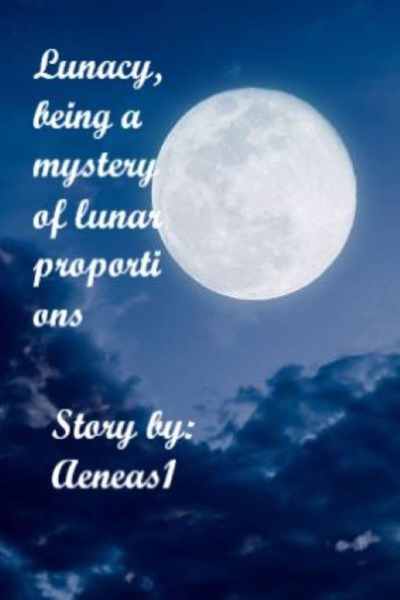There was a village somewhere close to the area, as I discovered on the map. Tebbington was its name. Unfortunately, I’d booked a ticket away from London towards the coast, but not to this village. So, as soon as I got off at the station, I looked around to ensure nobody else was looking, and then leapt over the turnstile gate with as much rigor as I could muster – living on a council estate such as the Andersen Estate will do that to one. I went down into the village. It was a rather pleasant area. It consisted of maybe twenty houses in total, their fronts all painted white, and with their chimneypots standing tall. Far off, I could see a wooded hill just on the edge of the village, rising up in a high manner, its wooded top concealing what was located there. In the village square, a marble statue stood, a very brightly polished white thing which depicted a general riding on a horse. I looked down at the streets, and stumbled upon realising that they were cobbled. This was my first time setting foot onto cobblestones. I staggered around like I’d had too much beer to drink and rested near the statue.
I got up and carefully stumbled over to what appeared to be the village pub. The pub’s name was The Caesar, and deep beneath its picture of Julius Caesar, his long nose finely painted, were the words “Veni. Vidi. Vici.” Not having learned Latin at that rubbish tip of a school, I didn’t understand for the life of me what those words meant, and I still don’t know any Latin now, but I damn well wish I did. Since I wasn’t allowed in the pub, I looked through the window and looked at a television hanging on the far wall, on which beamed the elegant face of Margaret Thatcher. I could tell she was saying something, but it was difficult to understand what it was, due to the fact that the voice was muffled by the glass, and by the fact that the patrons were pelting rotten fruit at the television.
I gave up and returned to the statue where I had rested my bones. I decided that it would be better to wait here before going on to Cubbington. I looked around at the people residing in the village. They looked rather ordinary, yet there was something about them that had that sense of uncanniness to it. I got up and began walking around, asking them if they’d heard of a village named Cubbington. The very second I spoke that name, they shrank back, their eyes wide with terror. A mother with long blonde hair covered the eyes of her child as if protecting her would keep her from hearing the name.
I eventually found a man standing on a box, around whom stood a crowd of people. The man was ranting, “Don’t go up into that forest, where the evil village Cubbington is. I repeat! Stay away from that hill if you value your lives!”
Eventually, an old man came up to me. He was thin, and gaunt, dressed in a brown cardigan and plaid fedora. He was leaning on a black walking cane. He looked at me, his eyes like two gigantic saucers.
“I couldn’t help but notice you were looking for Cubbington,” he said in a booming voice. He immediately began to stammer. “Young man, have you lost your wits? Must you go there, by God, must you go there?”
I nodded. I don’t want you to think I hadn’t considered the gentleman on the train’s warning. I had, but that’s human nature for you. If you’re forbidden to do something the chances of wanting to do it more will increase, and my curiosity had been piqued, despite the saying that curiosity would kill the cat.
“I want to visit that village,” I said.
“It’s not open to tourists,” snapped the old man, poking me with his cane. “I don’t know what made you want to come down here, but I’m warning you, if you want to keep the skin on your back you’ll get right back where you came from.”
“Why?” I snapped, my anger finally beginning to come forth. “What is it about that village you’re so afraid of?”
The old man trembled and sat down on a bench. A man dressed in an apron came forward. I very rudely asked him who he was.
“I’m the local barman, sir,” he said. His hair was short and neatly cropped, and across his chin was a stubbly beard. He had some sort of muscular body, and he looked immensely worried. There was some look in his eyes that showed that he was quaking all over, as I supposed one would have if they lived near a supposedly vile village.
“What is it about this village you’re all scared of?” I asked again, fully aware that a crowd of people had gathered where I was sitting by the statue. The barman crouched down on his knees right beside me and whispered, “It’s an evil village.” The manner in which he said it showed some sort of dread, as if he were worried that he were being watched at any moment.
“Is it true that most people who enter that place never come out?” I asked.
“Nobody ever comes out,” he whispered, in reply, “and nobody ever goes in. They are said to practice all kinds of devilry up there. Sometimes we hear them as they practice. In the forest on the hill, and we see the lights shining through the trees. We hear noises too: the beating of drums. We don’t know what’s going on up there, but whatever it is, it cannot be good. That is why we’re terrified of it, and the fact that they come out during the full moon doesn’t help much. Don’t think we’re any safer down here just because we’re far away from them.
“We’ve lost people during the full moon. Old age pensioners like that man who spoke to you have vanished in the night. Children too have vanished, snatched from their beds, leaving nothing but broken glass in their wake. Farm boys have also vanished whenever they go up there: unlucky farmhands who climb up the hill into the forest in order to gather kindling for the fires. Back when they used fires, that is. They never come out. It’s causing all sorts of trouble for the local farmers, because they have to keep hiring new workers.”
“Does the government know about any of this?”
“We’re in the provinces, lad. London doesn’t care. An entire plague could break out, all over the country, and they wouldn’t even notice. Thatcher probably wouldn’t intervene even if you asked her.”
“I don’t care about all this. I understand you’re worried, but I’m sure there’s nothing weird behind it. I just want to find this village, ask them to take me in, and let me earn room and board. I’m on the run and I can’t go back where I came from, even if you ask me. There’s a saying, and that’s ‘it takes a village to raise a child’? I’m standing by that, thank you very much. Now, would you kindly tell point me in the direction of Cubbington?”
Nervously, he pointed to the wooded hill. “Just don’t say I didn’t warn you,” he said. The old pensioner got up and came across to me.
“If you like,” he said, “I have a very good crucifix in my house. I can go back and get it for you, if you like.”
“That won’t be necessary,” I refused. The old man immediately turned white, as if he trusted the idea of a crucifix being able to keep me safe. He said that if I didn’t want the crucifix, he wouldn’t force me. Other villagers came up to me, offering plenty of useless trinkets to me. One man offered me a pocket-sized Bible I could keep in my raincoat, which I turned down. One old woman wearing a Russian headscarf offered me her dog, just to keep me company. The animal snarled viciously at me, and so I felt too terrified to accept her gift. The crowd babbled, and I said, “Look, none of your gifts are ones which’ll be useful to me. I don’t care what you think. I am going to this village.” I walked through the crowd, which parted before me as if I myself were carrying a deadly virus.
Thus I went on alone, walking towards the edge of the village, and when I reached it, I stopped and inhaled. It was here that I immediately began to doubt my conviction. The villagers had warned me about what I was about to do, and I was, for my part, inclined to heed their warnings. But I had promised to find that village, and I wanted to know more than anything what exactly was going on there. Even if I stayed there, chances are I’d probably recklessly disappear into the forest anyway. I looked back at that village I had come from, and then back to the forest, and then back to the village again. I couldn’t go back. I had to go forward.
Then, I walked forward, and into the forest. The trees here were thick, and their trunks extended high into the sky. The forest canopy blocked out what light there was, except for some slivers of light which were like the stars in the heavens in how they were positioned. I walked on, not hesitating for a second. Nothing was going to stop me from going to this village, much less the ramblings of a few superstitious fools.
My resolve gave way to fear when, all of a sudden, a big black shape passed me. It was making some sort of croaking sound. I didn’t understand what was going on, for it came suddenly, as though it had exploded out of a dark cellar in the woods. I could make out some sort of word, and that word was “Beware!” I found myself jumping back against a trunk of one of the trees, my skinny limbs shaking and my heart beating. The line passed, leaving one member still flapping its wings. It was a bird, its feathers black as night, making a croaking sound as it beat its wings in flight. So the entire shape was in fact a flock of ravens!
The raven flew it, still croaking “Beware! Beware! Beware!” until it was gone. I couldn’t help but find this ridiculous. Ravens couldn’t talk. Everyone knew that! And yet I couldn’t deny the fact that I’d seen an entire conspiracy of ravens warn me about what lay in the village. It was as if Mother Nature herself didn’t want me to go there, and she’d left various warning signs to try to stop me. Yet I wasn’t going to give up. Regardless, I leant back against the tree, afraid to go back and afraid to go on, and eventually I calmed down enough to continue my journey.
On and on I went, through the trees, along a straight road which seemed, to me at least, rather oddly like tarmac or stone or whatever these country people used to pave their roads these days. The forest was so dark I was uncertain as to whether I’d see the end of the road. Eventually I came out into…
…A village. A rather pleasant little village, like hundreds of others throughout Britain. The villagers had warned me about this village, but really, there was nothing really extraordinary about the place. It looked pleasant enough, apart from the fact that it was surrounded on all sides by the forest. Even at the furthest edge of the village, the forest rose higher up the hill and out of sight. Ravens could be heard, though, several of them. They were croaking like prophets of doom. I went down into the village. Some of the houses were terraced, and these were small and thick, like one long brick. One house in the middle of a terraced row was painted red for some reason. Indeed, I found it difficult to understand why the villagers of Tebbington were so terrified of this village in the first place.
I passed a cottage which looked rather pleasant. It had white walls, a thatched roof and a horseshoe over the door. I inspected the shoe and found that it was upside down. I scratched my chin with curiosity, trying to figure out why whoever lived there would nail a horseshoe to the lintel of his cottage in that manner, when I noticed someone coming towards me on a bicycle. It was hard to see who he was at first, but he came into view. He had long, dirty-blonde hair like the kind you’d see these days, all poofy and things like that, but the uniform he wore consisted of a blue jacket.
“Excuse me, sir,” I asked. “Is this Cubbington?”
He shrugged. “What else would it be?”












Comments (1)
See all